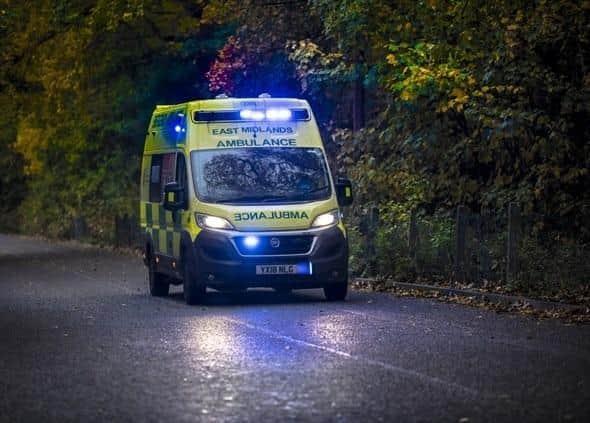What patients can expect as East Midlands Ambulance Service staff strike across Northamptonshire
and live on Freeview channel 276
As paramedics and staff from East Midlands Ambulance Service (EMAS) staff across Northamptonshire strike over a dispute with the Government about pay, here is what patients can expect during the industrial action.
What patients can expect
EMAS bosses say teams have “contingency plans in place”, but that they anticipate “fewer ambulances being available” so they expect responses to be “much slower”.
Advertisement
Hide AdAdvertisement
Hide Ad

They have also said - in a frequently asked questions (FAQ) segment - that “it is not possible to say how many colleagues will be participating in industrial action as it is a personal decision made on the day of action”.
A spokesperson added: “We have been working with our local and national trade union representatives to agree exemptions for patients which some GMB members may still attend during the period of industrial action.
“Our operational teams have been carefully planning with an aim to maximise the number of ambulance staff and volunteers we have available to respond to patients on the days of industrial action to seek to ensure that we continue to be able to respond to life-threatening or emergency situations.”
Bosses are also warning that patients may be asked to make their own way to hospital or a medical treatment centre, if it is safe to do so.
Advertisement
Hide AdAdvertisement
Hide AdThe spokesperson added: “If you are waiting for an ambulance, please do not call 999 again to ask for an updated estimated time of arrival for an ambulance.
“You should only call 999 again if you wish to cancel the ambulance because you are making your own way to hospital, or if the patient’s condition has significantly worsened.”
The bosses also said there are currently no plans for military involvement and that if staff are treating a patient at 6am when strike action starts they “must complete the patient call they are on before they are permitted to stand down, which includes in call centres as well as direct patient care”.
EMAS statement
Ben Holdaway director of operations at EMAS said: “During the period of the dispute, we will do all we can to minimise the impact on patient safety and will continue to work very closely with trade union colleagues, regional service providers and NHS Employers.
Advertisement
Hide AdAdvertisement
Hide Ad“Our operational teams have developed contingency plans to aim to maximise the number of ambulance staff and volunteers we have available to respond to patients, as well as clinical staff able to carry out remote clinical assessments.
“However, we anticipate that on days where there is industrial action that there will still be fewer ambulances available and therefore our responses to our patients will, inevitably, be much slower on the day.
“Therefore our 999 control rooms, where possible, will carefully assess and prioritise an ambulance response for those who need it most, and this may only be where there is a threat to life.
“Patients should continue to call for an ambulance as normal if they experience a life-threatening emergency and should continue to access other more appropriate services for any other illnesses or injuries such as NHS111 online or contacting their local Urgent Treatment Centre.
Advertisement
Hide AdAdvertisement
Hide Ad“We fully respect the right of NHS staff to take lawful and peaceful industrial action, however we do urge national employer representatives and trade union colleagues to proactively engage and reach a negotiated settlement to the dispute as quickly as possible.”
To find out more about EMAS’ response to the strikes and read more FAQs, visit the ambulance service’s website.
What GMB said when strikes were voted for
National secretary Rachel Harrison said: “Ambulance workers – like other NHS workers – are on their knees.
“Demoralised and downtrodden, they’ve faced 12 years of Conservative cuts to the service and their pay packets, fought on the frontline of a global pandemic and now face the worst cost of living crisis in a generation. No one in the NHS takes strike action lightly – today shows just how desperate they are.
Advertisement
Hide AdAdvertisement
Hide Ad“This is as much about unsafe staffing levels and patient safety as it is about pay. A third of GMB ambulance workers think delays they’ve been involved with have led to the death of a patient.
“Something has to change or the service as we know it will collapse. GMB calls on the Government to avoid a winter of NHS strikes by negotiating a pay award that these workers deserve.”
Picket lines are expected to be in place at ambulance stations across the region where union members are striking.